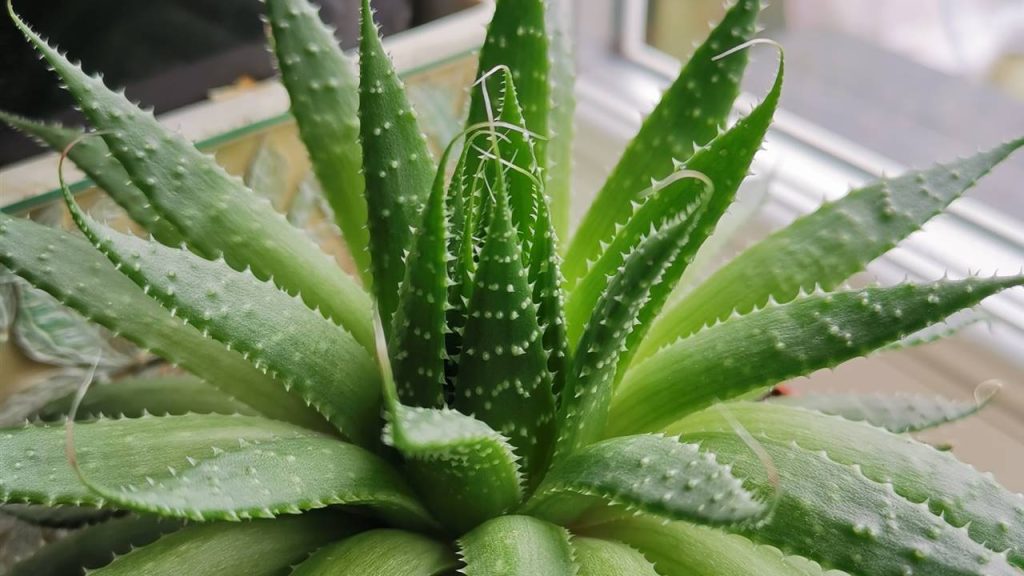The gel that is extracted from the aloe vera leaf possesses anti-inflammatory properties that can help in the treatment of psoriasis. Other medicinal plants have also been shown to be effective.

Psoriasis is an autoimmune and inflammatory disease that affects the skin and affects approximately one in 40 people. It is one of the most frequent chronic skin diseases and its incidence is increasing: in Spain cases have doubled in the last 15 years, according to the study “Prevalence of psoriasis in Spain in the era of biological agents”, published in the journal Actas Dermo-Sifiliográficas.
People affected by severe psoriasis often take medications that decrease the immune response, such as cyclosporine, but can increase blood pressure, cause long-term damage to the kidneys, and even increase the risk of cancer. Drugs in the category of corticosteroids are the most commonly used against mild or moderate psoriasis and can be applied externally, but these drugs cause the skin to become thinner and more vulnerable, and in the long term they cease to be effective.
TREATMENT OF PSORIASIS WITH MEDICINAL PLANTS
Safer treatment with medicinal plants is possible. Aloe vera gel has anti-inflammatory, antipruritic (anti-itch) and healing properties. In a study conducted at Malmö University Hospital (Sweden), published in the journal Tropical Medicine and International Health, it was found that an aloe vera-based cream was effective in 83% of patients, with a “significant elimination of psoriatic plaques”. Aloe creation was even more effective than steroid creams in reducing the clinical symptoms of psoriasis.
It is true that other subsequent studies have relativized the beneficial effects of aloe vera, but it is no less true that the application has no negative side effects, which is a great excuse to try this plant.
In addition to aloe vera there are other medicinal plants that may be indicated to treat psoriasis, according to an article published in Endocrine, Metabolic & Immune Disorders-Drug Targets. Different herbal components, such as alkaloids, steroids, terpenoids, polyphenols, phenylpropanoids, fatty acids, lipids and several other compounds show immunosuppressive and anti-inflammatory activity against psoriasis:
- Mahonia or Oregon grape, which contains the anti-inflammatory molecule protoberberine, is applied to the skin and can reduce the severity of psoriatic lesions. It is also recommended for hives, eczema and acne.
- Duzhong (Eucommia ulmoides Oliv.) and yerba mate (Ilex paraguariensis) extracts have antipsoriatic action, reducing the secretion of many proinflammatory cytokines such as tumor necrosis factor-alpha, interleukin (IL)-8 and IL-1b.
- Indigo naturalis (Chinese: qing dai) is a dark blue powder prepared from the leaves of plants such as Baphicacathus cusia, Polygonum tinctorium, Isatis indigotica and Indigofera tinctoria. This preparation inhibits hyperproliferation and abnormal differentiation of keratinocyte cells.
- Turmeric (Curcuma longa) is widely used in Ayurveda, the traditional Indian medicine, and Chinese Jan to treat inflammatory problems. Its main component is curcumin, which has the most powerful anti-inflammatory action.
- Ginger (Zingiber officinalis), also exhibits an antipsoriatic action like curcumin, due to the presence of 6-gingerol.
- Rhizoma coptidisand its main alkaloid component, berberine, inhibit in a dose-dependent manner the pro-inflammatory activity induced by tumor necrosis factor-alpha (TNF-α)2.
- The aqueous extract of Hypoxis hemerocallidea Fisch contains phytosterols and sterolins with anti-inflammatory properties.
- Taheebo (Tabebuia avellanedae), is an ancient medicinal plant, which has been used for more than 1,000 years in the South American jungle to treat inflamed skin.
- Centella asiatica is a traditional herbal antipsoriatic medication, thanks to its pentacyclic triterpenes.
- The decoction of the bark of Thespesia populnea Soland has proven to be very effective in treating skin disorders such as psoriasis, eczema and scabies. In addition, its leaves, flowers and fruits are also effective.
- Essential oils distilled from lavender (L. angustifolia, L. latifolia, L. stoechas and L.x intermedia) have been used to relieve symptoms of skin disorder in psoriasis, dermatitis and eczema.
- The topical application of tuhuai, a preparation of Chinese medicine based on Flos sophorae, Smilax glabra roxb and licorice, has antiproliferative properties and anti-inflammatory activity in psoriasis.
- Chinese medicinal plants such asTripterygium wilfordii Hook and Triptergium hypoglaucum Hutch possess immunosuppressive substances and anti-inflammatory properties that are effective against psoriasis and eczema with minimal side effects.
- Topical treatment with Camptotheca acuminate bark, with a 0.03% concentration of camptothecin, shows more antipsoriatic activity than 1% hydrocortisone. This plant is known as “the Chinese tree of happiness” or “tree of life”.






